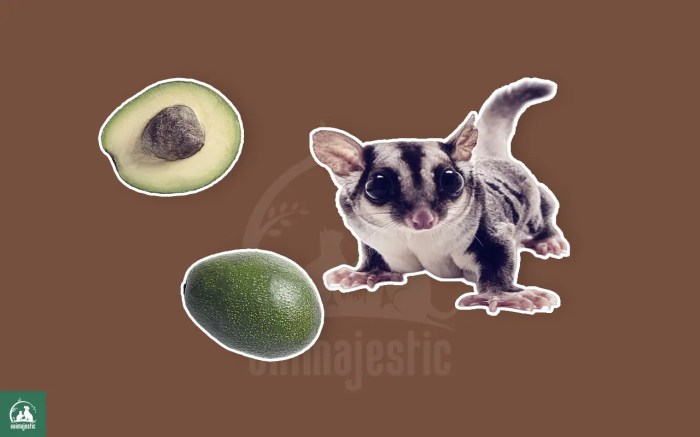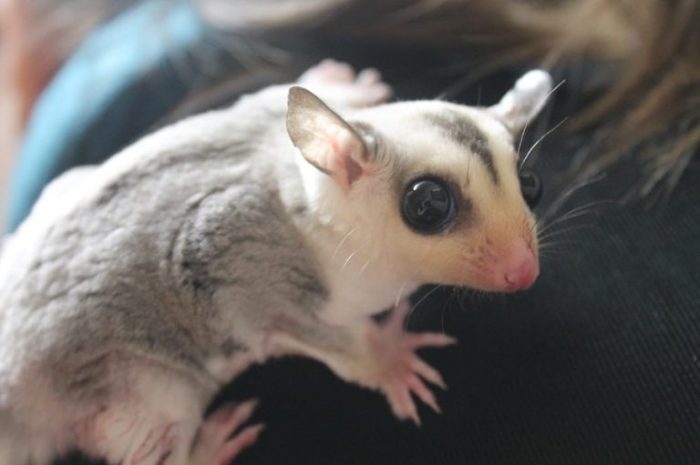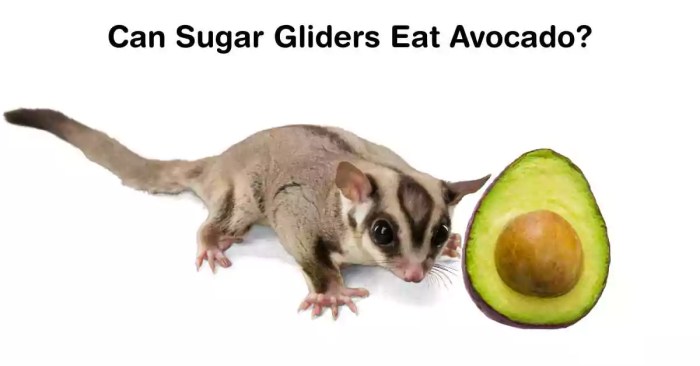Delving into the intriguing realm of sugar glider nutrition, we embark on a culinary exploration to unravel the mysteries surrounding the question: can sugar gliders eat avocado? Join us as we navigate the complexities of this topic, uncovering the potential benefits and risks associated with feeding avocado to these fascinating creatures.
Avocados, renowned for their nutritional prowess, have sparked curiosity among sugar glider enthusiasts. Their rich composition of vitamins, minerals, and healthy fats begs the question of whether these exotic fruits can enhance the well-being of our beloved pets.
Nutritional Facts of Avocado

Avocados are nutrient-rich fruits packed with various essential vitamins, minerals, and healthy fats. Understanding their nutritional composition is crucial for assessing their suitability for sugar gliders’ diets.One medium-sized avocado (about 136 grams) provides approximately:
Calories
231
Total fat
21 grams (of which 16 grams are monounsaturated fats)
Carbohydrates
12 grams (of which 9 grams are fiber)
Protein
4 grams
Vitamin K
26% of the Daily Value (DV)
Vitamin C
17% of the DV
Potassium
14% of the DV
Folate
20% of the DV
Magnesium
15% of the DVThese nutrients play vital roles in sugar gliders’ overall health and well-being:
- *Monounsaturated fats support brain function, cell growth, and energy production.
- *Fiber promotes digestive health, regulates blood sugar levels, and helps maintain a healthy weight.
- *Vitamin K is essential for blood clotting and bone health.
- *Vitamin C supports immune function and collagen production.
- *Potassium regulates fluid balance, muscle function, and blood pressure.
- *Folate is crucial for cell division, growth, and DNA synthesis.
- *Magnesium supports muscle function, nerve transmission, and energy metabolism.
Incorporating avocados into sugar gliders’ diets in moderation can provide them with these essential nutrients and support their overall well-being.
Potential Benefits of Avocado for Sugar Gliders: Can Sugar Gliders Eat Avocado

Avocados are rich in various nutrients that can provide numerous health benefits for sugar gliders. Let’s explore the potential benefits of incorporating avocado into their diet:
Healthy Skin and Coat
Avocados contain healthy fats, particularly monounsaturated and polyunsaturated fats, which are essential for maintaining healthy skin and a lustrous coat in sugar gliders. These fats help nourish and moisturize the skin, reducing dryness and promoting a shiny and healthy appearance.
Energy Booster
Avocados are a good source of carbohydrates and dietary fiber, which can provide sustained energy for sugar gliders. The carbohydrates provide a quick source of energy, while the fiber helps regulate blood sugar levels, preventing energy crashes and maintaining consistent activity levels.
Aids in Digestion
The dietary fiber in avocados can aid in digestion by promoting regular bowel movements and preventing constipation. Fiber helps bulk up stool and stimulates peristalsis, the natural contractions of the digestive tract, ensuring smooth and efficient digestion.
Enhanced Well-being
Incorporating avocado into a sugar glider’s diet can contribute to their overall well-being by providing essential nutrients, supporting healthy skin and coat, boosting energy levels, and aiding in digestion. A well-nourished sugar glider is more likely to be active, playful, and have a strong immune system.
Potential Risks of Avocado for Sugar Gliders

While avocados can provide some nutritional benefits for sugar gliders, it’s important to be aware of potential risks associated with feeding them this fruit.
Toxic Component, Can sugar gliders eat avocado
Avocados contain a toxic compound called persin, which can be harmful to sugar gliders. Persin is found in the leaves, skin, and pit of the avocado, and can cause digestive upset, respiratory distress, and even death if ingested in large amounts.To
mitigate this risk, it’s essential to remove the skin and pit of the avocado before feeding it to your sugar glider. Additionally, you should only feed them a small amount of avocado occasionally, as a treat rather than a regular part of their diet.
Appropriate Amount and Frequency
As a general guideline, you should only feed your sugar glider a small piece of avocado (about the size of a pea) once or twice a week. This amount is unlikely to cause any adverse effects and can provide some of the nutritional benefits of avocado.
Best Practices for Feeding Avocado to Sugar Gliders

When offering avocado to sugar gliders, it’s crucial to prepare and feed it safely to prevent potential risks. Here’s a comprehensive guide on how to do it:
Selecting and Preparing Avocado:
- Choose ripe avocados that are slightly soft when gently pressed.
- Wash the avocado thoroughly to remove any dirt or debris.
- Cut the avocado in half lengthwise and remove the pit.
- Use a spoon to scoop out the flesh and discard the skin.
Portion Size and Frequency:
- Offer small portions of avocado, no larger than a sugar glider’s thumb.
- Limit avocado consumption to once or twice a week as a treat.
Additional Tips:
Sugar gliders are cute marsupials, but can they eat avocados? To find out, you might want to check out some ap stats unit 5 practice test s. They’ll help you learn about probability and sampling, which can be useful for figuring out what foods are safe for sugar gliders.
So, if you’re curious about sugar gliders and avocados, don’t forget to brush up on your stats!
- Monitor your sugar glider after feeding avocado for any signs of digestive upset.
- If you have any concerns about feeding avocado to your sugar glider, consult with a veterinarian.
Alternatives to Avocado for Sugar Gliders

While avocado can provide some nutritional benefits to sugar gliders, it is important to consider alternatives that offer similar nutrients. These alternatives should be safe and beneficial for sugar gliders, providing a balanced diet that meets their nutritional needs.
One alternative to avocado is papaya. Papaya is a rich source of vitamins A, C, and E, as well as potassium and fiber. These nutrients support immune function, vision, and digestive health. Papaya can be fed to sugar gliders in small amounts as a treat or as part of a balanced diet.
Another alternative to avocado is mango. Mango is a good source of vitamins A, C, and K, as well as potassium and fiber. These nutrients support immune function, vision, and digestive health. Mango can be fed to sugar gliders in small amounts as a treat or as part of a balanced diet.
In addition to papaya and mango, other fruits and vegetables that can provide similar nutritional benefits to avocado for sugar gliders include:
- Blueberries
- Strawberries
- Raspberries
- Blackberries
- Sweet potatoes
- Carrots
- Broccoli
- Cauliflower
These fruits and vegetables are all safe and beneficial for sugar gliders and can be incorporated into their diet to provide a variety of nutrients.
User Queries
Can sugar gliders eat avocado skin?
No, avocado skin contains persin, a toxin that can be harmful to sugar gliders.
How often can I feed avocado to my sugar glider?
As a treat, avocado can be offered once or twice a week in small portions.
What are some alternative fruits for sugar gliders?
Safe and beneficial fruits for sugar gliders include blueberries, strawberries, raspberries, and grapes.